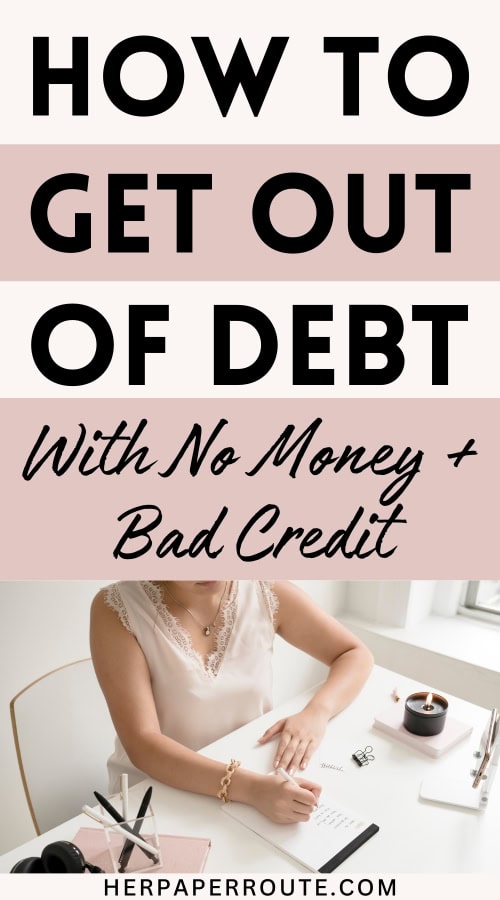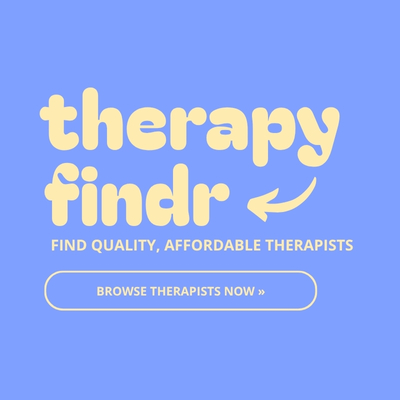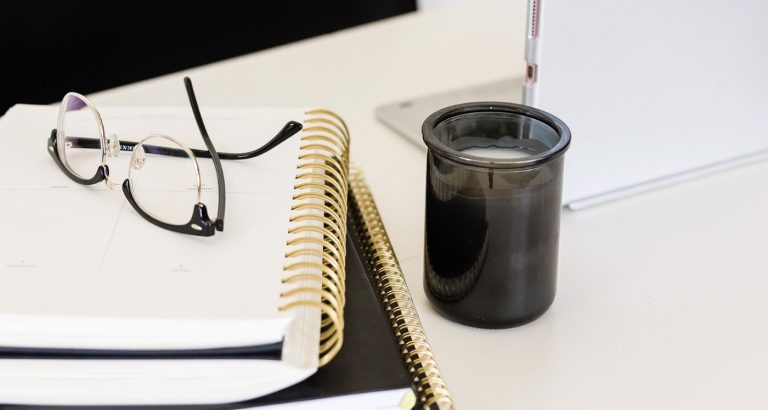How To Get Out Of Debt With No Money And Bad Credit

There is no doubt that getting out of debt is challenging for anyone.
This now becomes even more tricky when you don’t have any money to spare and you have bad credit. Debt is an incredibly complex mechanism to navigate.
As an affiliate partner of various brands and sponsored content, HerPaperRoute may earn commission on qualifying purchases. Disclaimer
However, it’s a common way of life, and it’s fair to say that many people have been in debt or are going to be in debt at some point in their lives.
That’s possibly why you’re reading this article. You’re sick of being in debt and want to get out of it but don’t know how because of your low income or high interest rates.
Debt isn’t something that many people like to talk about, but I would like to assure you that you’re not alone.
I was in your exact boat, but I’m here to tell you that it doesn’t need to be that way. Here are some methods that can help you get out of debt quickly, even if you have bad credit or no money.
Steps For Getting Out Of Debt Fast, Even On A Low Income
Step 1: Create A Budget
A budget is an excellent way to help you make better financial decisions, along with giving you an accurate idea of how much you can afford to pay towards your debt every month.
I recommend that you don’t try to manage your expenses in your head. Not only is this very inaccurate, but it can cause you unnecessary pressure as you need to try and remember these numbers.
A better way to prepare your budget would be to write these numbers down.
Seeing these numbers on paper helps you look at the bigger picture without creating pressure as you don’t need to rely on your memory. Preparing a budget can also help you decide if and where you may be able to accumulate money that can be put towards paying off your debt.
Use the free budget worksheets below to help you keep track of all your income and expenses.

For additional help walking you through budgeting, check out this post about budgeting for beginners.
Step 2: Distinguish Between Being Overspent And Broke
Many people use the term ‘broke’ far too loosely. Are you using this term to describe your financial position after you have spent all your money on nonessentials and items that aren’t bill-related?
Firstly, if this sounds like you, don’t be ashamed because many people are guilty of doing this. I know for a fact that I used to use the term constantly to describe myself after spending way too much money on an expensive bottle of wine. Why? Well, because I didn’t want to compromise on my ‘expensive taste’ even if it meant that I dug myself deeper and deeper into debt.
Secondly, recognize and take responsibility for what you’re doing. Your lack of money isn’t from being broke. It’s just the result of you simply overspending.
The first step to bettering your financial position is to realize this and not don’t be discouraged. When trying to get out of debt, you often feel like everything is out of control. I completely understand where you’re coming from and luckily this one element is something you can change.
Want somewhere to track your money across all accounts? Grab this free financial dashboard to track your savings, retirement, net worth, and more!
You can make some changes and better your overspending habits by changing a few things in your budget. This provides you with the ability to alleviate some unnecessary expenses to help generate spare funds and relieve some of your debt.
For upcoming expenses, you can set up sinking funds to help save up for life’s luxuries. Or if you don’t even know where to start, check out these recommended budgeting percentages to help you curb your spending outside of bills.
What if overspending doesn’t fit your situation? Don’t feel disheartened as you also hold the ability to make a change in your debt even if you are broke.
One piece of advice I have for you is to not make your financial situation worse by making irresponsible financial decisions. You can do this by stopping yourself from spending money on things that you don’t necessarily need.
Step 3: Establish A Plan
Paying off your debt requires some organization. You can help provide this organization by starting a plan. Even if you don’t have any money to put against your debt yet, it’s an incredible system to begin listing all of your debts, along with interests and the balances which accompany these debt amounts.
Within your plan, you should prioritize your accounts and note the order you wish to pay these off. An example could be that you start paying off your debt with the lowest amount owed rather than the highest interest rate since it’s been shown to be the most effective method.
The ideal situation would be to free up more cash by looking at your budget and removing unnecessary expenses from it (I have more on that below), but the best place to start is to work with what you’ve got.
Related: Can Gazelle Intensity Get You Out Of Debt Faster?
Step 4: Stop Making More Debt
Stopping yourself from accumulating more debt may seem like a simple solution, but you wouldn’t believe the number of people that add to their debt while trying to get out of it. Debt is a hideous cycle and it is also incredibly stressful for households. That’s why taking out a loan to pay back your debt may seem like the best course of action.
I’m here to tell you that it most certainly isn’t. It isn’t far-off to say that you’re pretty much acting in a state of survival. You aren’t thinking straight.
That’s why I’m here to tell you that taking out a loan to pay your debt isn’t the way forward. Remember that accumulating new debt increases the payments you have to make each month. This results in additional pressure being added to your financial situation.
I have experienced this before, but you need to realize that credit cards aren’t the answer if you’re serious about getting out of debt. Yes, it’s tough to live without these pieces of plastic when you’re struggling with money, but there are other ways that we are going to get into to help alleviate financial stress.
Step 5: Increase Your Income
Money is the element that’s putting you in debt, and it’s also the feature that can take you out of it as well. Increasing the amount of money you earn accomplishes two objectives.
The first is that you don’t need to rely on using credit cards to get you through the month. This is excellent because it prevents you from accumulating more debt. The second objective you’re able to achieve is that you gain more money to put towards paying off your debt.
You’re probably thinking, ‘How can I increase my income?’ There are so many ways, but some of the most common methods include selling unwanted electronics or unnecessary items you may have lying around the house, along with doing freelance work, taking on a second job, starting a small business, making money from some of your interests or hobbies, or doing odd jobs.
Related: Here’s a huge list of stay-at-home job ideas.
Step 6: Find Ways to Cut Your Expenses
Planning your finances shouldn’t be guesswork. Organization and structure are key. A great start to cutting any costs down is to review your bank statements. This allows you to see where you’re spending most of your money. The brain is a brilliant and complex mechanism, but that doesn’t stop certain, critical purchases from slipping your mind.
When reviewing your bank statements, analyze each and every purchase you have made in the recent months or year and seriously ask yourself whether you can live without this particular expense. The key to this exercise is to be completely honest with yourself.
Trust me when I say this because I am the first to admit that I would argue with myself about whether purchasing the slightly more expensive fruit juice was justified. I fought myself tooth and nail, but I ultimately landed with the decision that my life wouldn’t end if I bought the cheaper option. Now, I’m alive to tell the tale.
It can go that far because something that many people don’t understand is that small amounts of money add up and before you know it, you’re paying an extra $150 a week on groceries just by buying the ‘better-quality’ products instead of settling with the cheaper alternative that, let’s face it, tastes exactly the same.
Other ways to save on food is to use coupons, meal plan, and prepare freezer meals so you aren’t tempted to eat out all the time after a long day at work. If you want to save money on dates and other fun activities, check out this list of free or cheap date ideas.
Or if you want to maximize your savings, look at these ideas from the Great Depression Era that can still save some serious cash today.
Try to remember that you’re not analyzing these purchases for no reason. There is a purpose behind it, and that purpose is to get you out of debt.
You are going to have to wrap your head around the fact that you’re going to need to make temporary sacrifices. The reward is worthwhile as you get to better your financial position, and you can still add these expenses back once you’re debt-free again. This situation isn’t forever.
Step 7: Avoid Late Payments
Late payments should be avoided at all costs. This is because these slow down your debt pay-off progress. A late payment is going to ultimately result in you having to double up on your payments the following month, and you’re going to have to pay a late fee.
This is money that could be put towards reducing the remaining balance. Another element to consider is that late two late credit card payments against your name in a row is going to trigger the penalty rate. This is another costly event that’s going to make it more challenging to pay off your debt.
To avoid late payments, use this method for organizing your bills that will prevent you from forgetting or misplacing bills that are due.
Step 8: Think About Consumer Credit Counseling
These methods should only be considered after talking it over with a qualified financial attorney and certified financial planner since the ramifications are vast.
A credit counseling agency is an incredibly helpful tool where you can work with an experienced worker. This advisor reviews your finances with you to help you come up with an effective budget that incorporates monthly debt payments.
Another exceptional feature about working with a debt counselor is that there are still options available for you, even if you can’t pay anything towards debt payments. The credit counselor can work out a DMP (debt management plan) with your creditors.
You are usually given the ability to make lower monthly payments to your creditors. You may also be able to make a singular monthly payment to your credit counselor, which is ultimately distributed to each of the creditors you owe money to. This system is extremely beneficial.
The main reason for this is that you gain the opportunity to pay smaller amounts of money to your creditors, which reduces the pressure placed on you to gather more funds to meet the larger payments. The other advantage is that you get to make one payment. This eliminates the risk of you forgetting to pay your creditors on time and accumulating late fees.
Some people consider debt resolution and debt settlement. I go over the difference between the two but do note that either will have a significant effect on your finances.
You should keep in mind that some institutions may not provide you with debt relief programs if your credit is bad. Don’t let this dishearten you, as some institutions are more accommodating than others regarding credit score ratings.
Another option you should consider would be to enquire about non-profit debt management. These are excellent debt relief options that are available to people who have bad credit.
How To Get Out Of Debt On A Low Income – Conclusion
If I can give you one piece of advice, even if you wish not to implement anything else in this article, it would be to not to get overwhelmed. I know that this may not seem possible at times and you may be a ball of stress.
It’s good to remember that Rome wasn’t built in a day and reviewing the entire picture of your debt is quite like the roadmaps of Rome.
Take it one step at a time and you are soon going to find yourself becoming familiar with your surroundings and eventually navigate others around where to go and what to do. This situation isn’t permanent, and even though it may seem like it, you’re not going to be stuck in debt forever if you take the necessary steps.
Concentrating on one debt at a time helps make the repayment process a lot more effective. Tracking your process and rewarding how far you have come is a great way to keep motivated.
You’re essentially running a marathon and not a sprint, so don’t burn yourself out by working on an unsustainable level to try and pay back all your debt rapidly. This usually results in you falling behind on your debt repayment program once you reach the burn out stage and start raking up more debt from late payment fees.
Being debt-free isn’t an unobtainable goal if you take baby steps, track your progress, celebrate the milestones you reach in your debt repayment process, and keep working at it until your debt is entirely paid off.
Related Articles:
- How To Set and Achieve Financial Goals
- Unique Ways to Pay Off Your Debt
- Creative Visuals To Keep You Motivated During Debt Paydown
- Easily Make Your Own Debt Paydown Visuals You Can Color In

Follow along on Instagram!







![$13 an Hour is How Much Per Year? [Before and After Taxes] 9 putting puzzle together about $13 an Hour is How Much Per Year](https://herpaperroute.com/wp-content/uploads/2022/03/13-an-Hour-is-How-Much-Per-Year-768x410.jpeg)
![Personal Financial Literacy [Easy Step-By-Step Guide To Finance 101] 10 woman reads an articvle on her phone about Personal Financial Literacy](https://herpaperroute.com/wp-content/uploads/2021/11/Personal-Financial-Literacy-explained-768x410.jpeg)


![Your Life After Mortgage is Paid Off [What to do and What Changes] 13 happy woman who just paid off her mortgage explains what Your Life After Mortgage is Paid Off can be like and what to expect](https://herpaperroute.com/wp-content/uploads/2021/11/Your-Life-After-Mortgage-is-Paid-Off-768x410.jpeg)